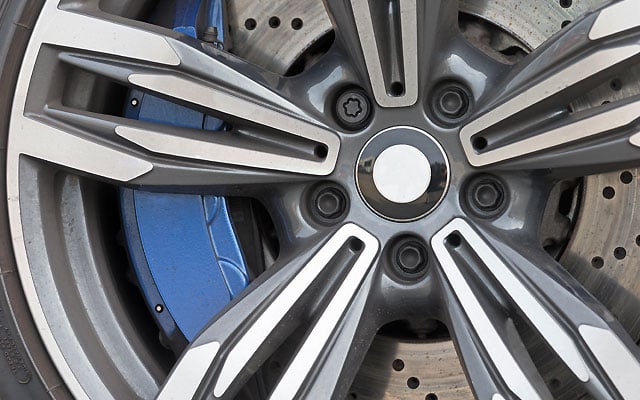Your brakes will gradually wear down as you use them and need to be replaced. But how do they work, how often do they need replacing and what happens when you have brake problems?
Find out all about car brakes in our article.
In this article |

How do car brakes work?
Most cars will have disc brakes on their front wheels and either disc or drum brakes on their back wheels.
With disc brakes, when you press the brake pedal, the hydraulic brake fluid makes the brake caliper push the brake pad against the brake disc. As the brake pad rubs against the brake disc, the friction slows down the wheels.
What are the parts in a car’s braking system?
- Brake discs - Metal discs that rotate along with the wheel.
- Brake pads - Pads on either side of the brake discs that cause friction when the brake pedal’s pressed.
- Brake calipers - Contain the piston and brake pads. They clamp onto the disc when braking.
- Brake lines - Transport brake fluid through the braking system.
- Brake fluid - Fills the brake lines and uses hydraulic pressure to activate the calipers when the brake pedal’s pressed.
- Brake master cylinder - A hydraulic piston attached to the brake pedal to pressurise the braking circuit and activate the brakes.
- Brake servo - Attached to the master cylinder, it uses vacuum generated by the vehicle's engine or a pump to increase the pressure when the brake pedal's pressed.
Disc brakes vs drum brakes
Disc brakes are more expensive than drum brakes and are usually considered to be better. Braking creates a lot of heat which needs to escape quickly. Disc brakes work well because they:
- Have a more open design which lets in air to cool them down and makes them less likely to overheat.
- Work better in wet conditions.
- Are less likely to lock up.
It’s normal to see discs at the front, where they do most of the braking. Cheaper drum brakes are often used on the rear wheels as parking brakes. Larger or more powerful cars tend to have disc brakes on all 4 wheels.
Parking brakes
A car’s handbrake activates a cable which squeezes the rear brake pads closed and stops the car moving. Some cars have separate discs and pads specifically for the handbrake.
Other cars have an electronic parking brake which uses a button instead of a handbrake. The car’s handbook will show how to release the brakes if the car battery's flat.
ABS brakes
Anti-lock brakes include a sensor on the wheel hub which senses how fast the wheels are going. When you brake, the ABS senses if the wheels are about to lock. An ABS pump, with a piston for each wheel, rapidly pulsates pressure to the wheel(s) about to lock. That prevents the car from skidding and helps the driver to maintain control.
Learn more about brakes:
How long do car brakes last for?
It depends on how they're used and how the car's driven. Usually, the brake pads need replacing regularly because they wear out over time. This can be anywhere from 25,000 to 60,000 miles or more, but there’s no set rule.
The vehicle’s weight, carrying heavy loads and towing will all affect the brakes' life-span. Brakes last much longer on EVs and hybrids as they use the electric motor to slow the vehicle, called ‘regenerative braking’.
When should I replace my brakes?
If you notice any problems with your brakes, you should take your car to a mechanic. Problems can include:
- Brakes not as sharp as they used to be
- Noisy or squealing brakes
- Spongy brakes
- Leaks from the brake lines
- Vibrations or pulling through the steering wheel when braking
- The brake warning light comes on
When should I replace brake fluid?
You should replace your brake fluid every 2 years, regardless of mileage. That’s because:
- Brake fluid absorbs water from the atmosphere.
- In extreme cases, the heat from the brakes can cause water in the fluid to boil and vaporise.
- Vapour makes the brakes feel ‘spongy’ as it compresses when the pedal's pressed instead of maintaining pressure as liquid does.
Need to book a service or MOT? Book online with Smart Care.
What causes car brakes to wear or become damaged?
There are a number of reasons why brakes wear over time. General use will wear the brakes down while infrequent use could lead to corrosion. Brakes will also wear faster if you have a heavier vehicle or brake a lot going downhill.
General wear and tear
- As they’re used, friction wears brake pads and discs thinner.
- Vehicle manufacturers specify a minimum thickness, and when they get too thin the discs must be replaced (always in pairs).
- Brake pads must be replaced at the same time as discs.
Corrosion
- Brake components rust easily.
- On front brakes, surface rust is quickly rubbed off by the action of the brake pads on the discs.
- Rust can build up on rear brake discs which aren’t used as often - especially on light cars or ones only used for local trips.
- Corrosion isn’t normally a problem with rear drum brakes.
- Light corrosion can come off with heavy braking, but if not, the corrosion gets worse and can lead to surface pitting.
Vehicle and driving style
- Brakes on heavier vehicles will wear out faster.
- Heavy braking from high speed causes most wear, like on motorway slip roads.
- Driving in lots of stop-start traffic causes more wear on brakes.
Troubleshooting brake problems
Get your brakes checked at a garage if you notice any of these problems:
Squealing brakes
- A metallic squeak when you brake could mean the brake pads are worn out and the metal backing is scraping on the disc.
- This can score the discs and seriously affect brake performance.
- It’s most likely because the brakes weren’t serviced but it could be a sticking piston in a caliper pushing the pad against the disc.
- Discs will likely need replacing if early symptoms are ignored.
Juddering brakes
- If you feel juddering through the brake pedal, your brake discs could be distorted.
- Uneven heating and cooling can change the shape of the disc, with thinner or worn discs more likely to warp.
- It could also be due to run-out brakes, where discs aren’t fitted flat against the hub and move in and out as you brake.
To avoid getting distorted discs, use a lower gear and engine braking when you’re driving down long hills. This avoids using the brakes too much and making them heat up.
Spongy brake pedal
- If the brake pedal feels spongy or lacks resistance when you press it, there could be a problem with the brake fluid.
- If there’s little to no resistance, you could have a dangerous leak, which you’ll need to call out breakdown assistance for.
- If the pedal is spongy, you’ll need to get your brake fluid replaced at a garage.
Published: 17 November 2016 | Updated: 18 November 2020 | Author: The AA
